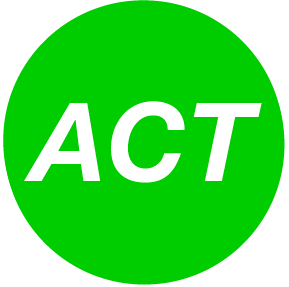Why we use a .org domain
When I founded ACT, I wanted to create a collaborative platform that would allow consumers to transform from passive spectators into active participants for environmental change. ACT is the embodiment of a social enterprise, and I wanted the values and principles that drive ACT forward to be reflected and to be easily noticeable in the domain name for all stakeholders.
At its core, ACT is about enabling collective action. It is about empowering all people to make a free and informed decision on buying Tomato A over Tomato B. There is often a huge difference in the environmental footprint of production even within the same grocery category. For instance, one tomato producer can have a CO2 footprint that is 3-10 times higher than another tomato producer. Choosing the more sustainable of those two options and scaling it as a global effort may be the highest impact action that our society can use to tackle the climate crisis.
ACT helps users find low-impact product alternatives that benefit our society and our environment. That in itself is reason enough to think of ACT as more of an organization than a straightforward, for-profit company. But ACT is both a worker cooperative and a limited liability company,* a hybrid, and, for the sake of transparency, I want to draw attention to the reasons behind the organizational model.
It helps us grow
Fundraising is essential for growth. We aspire to build a global platform to help people find collaborative solutions to some of the world’s greatest challenges. This is a lofty goal. ACT would not be here today without the support of our visionary investors. They invest in the vision of ACT rather than a finished product. Our investors have supported us ever since ACT was nothing more than an idea, and have given us insight, advice, and resources that helped us develop and grow. Once we start to scale, attracting capital will be even more important, with the hybrid structure we will be able to achieve that.
It makes us more democratic
The ACT organization structure is inspired by the biggest worker cooperative in the world, the Mondragon Corporation. In short, every member has one vote in important company decisions while the salary range between the lowest- and highest-paid members of staff goes from 1 to 8. Membership is open to all active employees. These measures make ACT a Workers Self-Directed Enterprise (WSDE) and keep us accountable to our employees, increasing instances of holistic thinking and allowing us to stay true to our vision, by placing the responsibility for the direction of the company on more hands than in a conventional company. We also emphasize educating our employees so that they are equipped to take initiative. In short, we encourage them to think like an entrepreneur at the job. This requires extra effort, but we know that it will make us even more resourceful.
It attracts talent
Being a democratic hybrid of a traditional company and a worker cooperative allows us to recruit top talent. We have been able to attract the most talented individuals to our team, despite a very competitive recruiting market. Our staff is made up of motivated, talented and dedicated individuals, who love working with cutting-edge technologies and practices, but also want their work to have the highest possible impact on society while having an equal vote on these matters.
Our platform is highly complex, and it required a lot of bootstrapping before reaching a Minimum Viable Product. We might not have been able to retain the incredible people on the ACT team without giving them an equity stake in the future of the company. They invest in ACT with their competencies and their time. Our legal status as a for-profit company means that we were able to do that.
We are a for-profit business that strives to do good. We have a social mission, but we go about reaching it through commercial means.
This is what allows us to keep building a platform to facilitate a global movement of people who champion environmental sustainability and workers’ rights. Because ACT is a cooperative/limited company hybrid, I believe the .org domain communicates this in the best way possible.
We have a fantastic opportunity to take action, but we have a small window of time to do it. Let's use this time to show what we can do when we act together.
Thomas Jepsen, CEO
* ACT is two companies: a democratic worker cooperative who owns the major voting stock (consisting of a single A Share holding the majority of the voting power) of a traditional equity-based Limited Liability Company (LLC). An LLC is by definition not democratic because the major shareholders decide what to produce, where to produce and what to do with the profits. By having a democratic parent company owning the majority of the voting power, our worker’s cooperative/LLC hybrid becomes a democratic entity. Investors can buy a stake (B Shares) in the LLC, but the majority of the decision-making power rests on our employees who can freely choose to be members of the democratic parent company.
